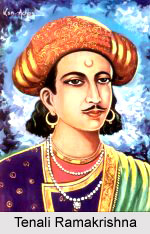 Tenali Ramakrishna was the court poet of the Vijayanagara Empire in the 16th century AD. He was also popularly known as `Vikata Kavi`. He was one of the `Ashtadiggajas`, who were the patrons of Krishnadeva Raya. He is very popular by the name `Tenali Rama` in few parts of South India and the children can easily associate with him by his witty stories.
Tenali Ramakrishna was the court poet of the Vijayanagara Empire in the 16th century AD. He was also popularly known as `Vikata Kavi`. He was one of the `Ashtadiggajas`, who were the patrons of Krishnadeva Raya. He is very popular by the name `Tenali Rama` in few parts of South India and the children can easily associate with him by his witty stories.
Tenali Ramakrishna was believed to be a minister in the royal court. Again, according to another popular belief, he was a famous court entertainer. But the most accepted one is that he was a well-known poet. His family belonged to Tumuluru near Tenali in Guntur district. He was also known as Tenali Ramalinga, which is Shaiva name. It is said that he converted to Vaishnavism later and was named as Tenali Ramakrishna.
Tenali Ramakrishna was admired for his wit and humour and in particular for his practical jokes. He dedicated his poem called `Udbhcitaradhw Charitramn` to Nadindla Gape, who was the governor of Kondavidu during the reign of Krishnadeva Raya. The `Panduranga Mahatyam` of Tenali Ramakrishna is regarded as one of the `Pancha Kavyas` i, e, the five great books of Telugu Literature by the scholars. The theme of this great composition was taken from `Skanda Purana` and then he developed it with the additional stories about the devotees of God Vittala. He composed in Prabandha style of writing.
Some other literary works include the Linga Pnranamu, Panduranga Mahatmyamu and Gbatikacbala Mahatmyamu. Tenali Ramakrishna was proficient in several languages such as Telugu, Marathi, Tamil and Kannada. Based on the story of `Udbhata`, a monk, he composed the `Udbhataradhya Charitram`. He also wrote `Ghatikachala Mahatyam` based on Ghatikachalam, a place of worship for God Narasimha near Vellore in Tamil Nadu, India.
Tenali Ramakrishna possessed the art of mocking other poets and great personalities. An imaginary character named `Nigama Sarma akka` was created by Tenali Ramakrishna and he built a story around her without giving her a name. He also composed many extempore poems called `Chatuvu`.



















